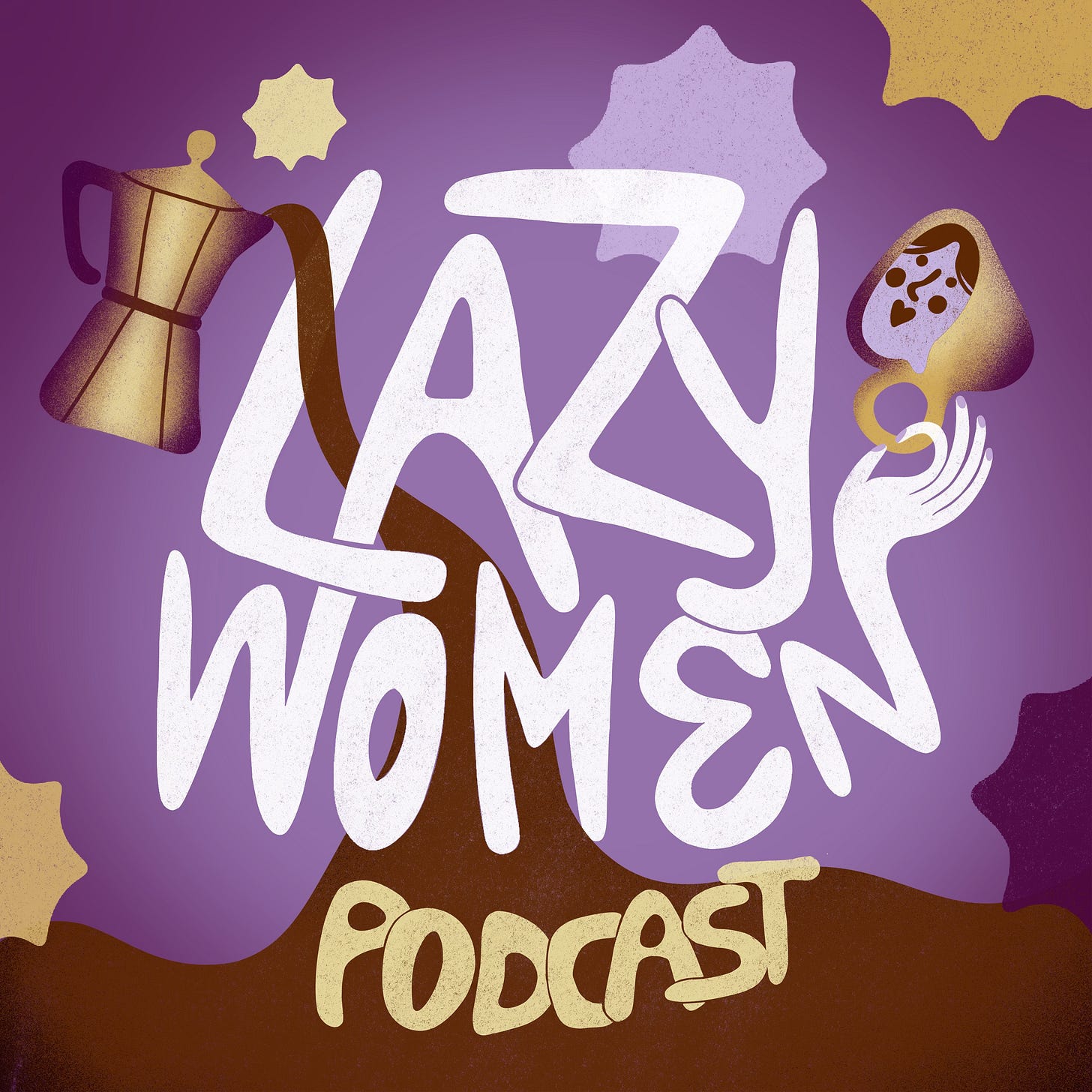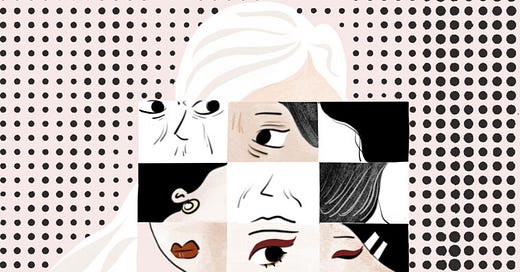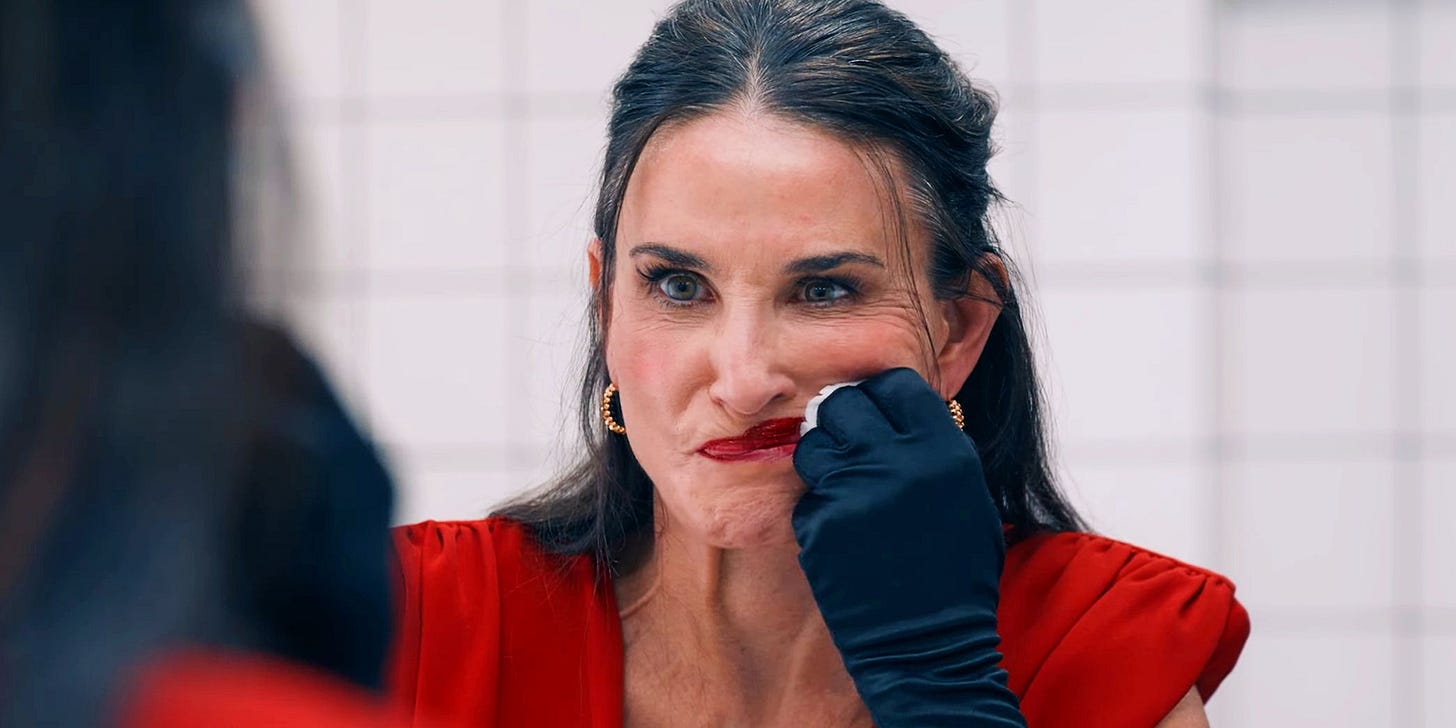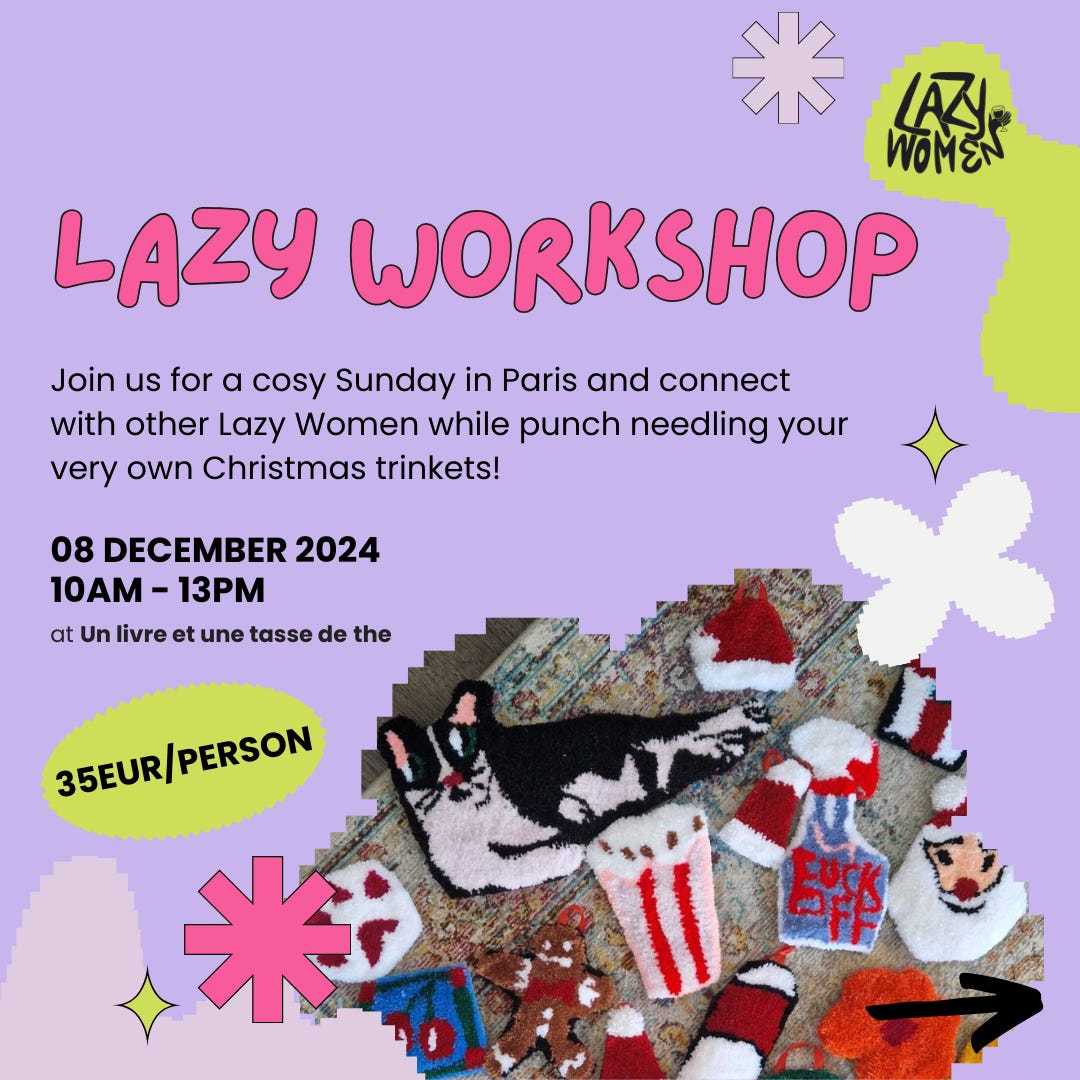Dear Lazies,
It’s getting nippy, and there seem to be chilly winds blowing across the world as well. The recent US elections have reminded us that progress itself is a work in progress, and the slightest hesitation can lead to several steps backward. This month’s edition is a chance to reflect on where women stand today – what our emancipation means and what its future will look like, a slightly serious mood before we slip into the holiday spirit. We’re also talking of beauty standards and ageing in this issue - and whether it’s possible to have it all. But fear not, we start with a few recommendations that’ll lighten the mood and make you search for the faint silver linings.
This issue features illustrations from Fdor and Safae Boudrar
Your Lazies
There are pivotal moments throughout history where our regular world blurs into literature. As newer generations witness first-hand the rise of problematic politics and regressive attitudes, our collective rage and grief compounds with the helplessness of others who have seen this sort of thing before. The age-old comparison of Margaret Atwood’s The Handmaid’s Tale and the repealing of women's rights is telling yet the genre of feminist dystopia in literature is by no means limited to one novel. In fact, it is lived experiences that directly birth many of these stories.
We've put together some complimentary reading suggestions to feel all the feels and also allow your mind to wander.
🌅 Morning read: Bitch Planet Volume 1: Extraordinary Machine: A Novel by Kelly Sue DeConnick.
Bitch Planet is a feminist graphic novel that uses a patriarchal dystopian society to highlight the exploitation of women.
🌃 Evening read: Homesick for Another World by Ottessa Moshfegh.
This author allows you to get lost in multiple tales of humans, animals and the unknown. Get uncomfortable with how delicate life is and at the same time, revel in its wonder.
🌅 Morning read: Vox by Christina Dalcher.
Imagine waking up to an America that has stripped women of their basic human rights like the right to education and the freedom of expression… Doesn't sound so foreign huh?
🌃 Evening read: The Once and Future Witches by Alix E Harrow.
Set in the late 1800s, this is a tale of sisterhood, spells and suffrage. A good read to transport you away to different times whilst still emphasising with the protagonists.
Written by Poppy
Recent US elections made us think of the privileges we don’t often treat as such, accepting them as a given: from freedom to move and live the life you choose to access to abortion, as bizarre as it sounds in the 21st century. We asked 2 Lazies from our community to comment on that.
“As someone in South Asia, Trump’s often hateful politics scares me because I live in a country currently overwrought by communal strife. I remember the pit in my stomach when I heard of the Muslim Ban in 2020. As an Indian living in India, the fact that the so-called centre of democracy was no longer an example to follow, or even one which would hold accountable countries which are still politically evolving, is scary. If the supposedly democratic West was so oppressive, where do we even stand? Not to mention, Trump’s ascendancy personally impacts friends settled in the US, who moved for their education and now live in fear that their H1+B visas may be cancelled, that the hard work they put into making America their home, would all go to waste. “
– Chaharika
“In countries like mine (Venezuela), where we are light years away from actually getting a legal and safe abortion, the increasing number of Trump’s followers due to the political bias regarding the current dictatorship that is still ruling the country, it’s discouraging, not only those living inside the country, but also those exiled in the US. That mantra of “the enemy of my enemy is my friend”, has been sadly permeating so many in our historical context, mostly because of the desperation and the sense of urgency from getting out of the biggest crisis we have ever had in our entire history, that I understand to its core, but which the US wouldn’t actually solve. It breaks my heart to see that in the mainstream opinion, if you’re against policies from someone like Trump, then in the eyes of a fair amount of those who have endured the same as you, you are automatically a traitor.
Now, if we go to the domino effect that Trump’s election can have globally, we can think about the entitlement that some world leaders can get from it, especially the ones aligned with his political views. Not only will this influence the racist and white supremacist narrative in countries like Hungary - where I live - which already has a fair share of this by the validation that the current government gives to it, but also by the belittling of women and the power by association that lawmakers may have in parliaments, and may use in order to overturn whichever law women have already worked so hard for to make a reality. – Maria
Pretty Please: The Cost of Conforming to Beauty Standards (written by Julie)
Having spent a few years of my teens as an awkward nerd girlie, I was shocked to see the whole world change when I turned 15 (it does sound like a nod to The Summer I Turned Pretty, but hear me out). To me, it was the summer I dyed my hair bright red for no particular reason. Suddenly, everything shifted—people (men, to be precise) treated me differently, doors seemed to open, and life itself felt brighter and more colourful. I never imagined that a simple red dye could grant me what I came to realise was ‘pretty girl’ status.
It was wild, especially because I hadn’t changed internally. That was the first time I experienced pretty privilege, and while it felt surreal, I soon realized my experience wasn’t as unique as I thought.
Pretty privilege, a form of cognitive bias, refers to the advantages and preferential treatment that people deemed conventionally attractive receive in various areas of life simply because of their appearance.
It’s undeniable: pretty people tend to have it better. We’re drawn to certain standards of beauty, gravitating toward particular facial features, body types, and looks, often unconsciously treating those who embody these standards with more kindness, attention, or favour. From dating and professional settings to social interactions, appearance holds a sway that’s hard to ignore.
Yet, this privilege is also superficial and conditional. It is tied to fleeting and often unattainable standards of beauty that vary by culture, region, and era. For those who don’t fit these narrow ideals, the consequences can be significant, ranging from exclusion and bias to mental health struggles, including body dysmorphia or an overwhelming desire to ‘fix’ themselves. We know this, yet the obsession persists. Many of us still find ourselves losing our minds in front of the mirror, consumed by the pressure to measure up (the dinner date scene from The Substance, you’ll always be famous).
Coming from Eastern Europe, I’ve witnessed the chokehold beauty standards have on women with my own eyes. The culture of constant grooming, strict beauty regimens, and the unspoken rule of always appearing ‘put together’ might seem exhausting from an outsider’s perspective, but for many, it’s second nature. That’s why the slavic doll/bimbo trends on TikTok were rather…curious for me to observe after so many years. ‘So…you’re mocking us, but also making the very same image look trendy at the same time?’, I thought.
I’m no exception to the stereotype — for the bare minimum, I’ve had my nails meticulously done ever since I was 14. It’s not just a habit; it’s a discipline, a way of life, although it feels difficult to explain to those who haven’t lived by it. The relentless pressure to maintain one’s appearance becomes so deeply ingrained that it feels less like an imposition and more like a natural part of existence.
It wasn’t until I moved to Western Europe that I realised just how much of this pressure I carried with me. For the first time, I started questioning the weight of these standards: Who decides them? Why do we uphold them? And, most importantly, who benefits from keeping women preoccupied with beauty rather than power?
Pretty privilege might seem like a cool thing, but it’s a trap disguised as power. It reinforces a system that commodifies women’s bodies and reduces their worth to their appearance, all while excluding those who don’t fit conventional frames. But this system doesn’t just hurt those left out; it also restricts those within it, chaining them to the exhausting pursuit of an ever-shifting ideal.
The first step to dismantling this dynamic is awareness, I think — recognising how pretty privilege operates in our daily lives (along with our biases!) and the ways we consciously or unconsciously reinforce that. From there, we can work to shift our focus from external appearances to internal values, championing diversity in beauty and decentering the notion that a woman’s worth is only tied to her looks. Is that realistic? Not sure, but we can at least try.
Ultimately, the goal isn’t to shame those who benefit from pretty privilege but to question a system that encourages it at all. Because true empowerment isn’t about being seen as beautiful; it’s about being seen as enough—just as you are. That is, the compliments on my appearance are boring, anyway - I’d much rather be appreciated as intelligent, fun and interesting…
We’ve got a new article this month…
And it’s right on the theme of the newsletter! Check Our Obsession With Expiration: Ageing as a Woman by Mária Gubán, a cultural journalist and a researcher based in Amsterdam.
This piece sparked a discussion in our community, as the topic of female ageing remains relevant in many different countries.
Here’s our member María’s comment on this:
In Venezuela we have heavy beauty standards coming from the famous beauty contest tradition, that discards women once they get older, as if they don’t work for their purpose anymore, or if there was an inherent debt of owing prettiness (under certain racial canons, obviously) to a shallow society, which transfers to the every day life, and how little girls are raised. This is, of course, related to the very present classism in the country, alongside the male chauvinistic culture that some men deny by saying: “but our society is matricentric” like if this fake try to glorify women would automatically delete the abuse suffered for several years, overlooking the actual source of why this matricentric approach has become a trend in Venezuelan families, and why older women have been affected the most by this situation.
This article is wonderful not only because of the variety of nuances it presents, but also because it reminds me of my great-grandmother, a - somehow- rebel to her era. She was from a very rural area in the mountains, but she moved to a more populated town with her family. Some time after her husband passed away, she ran away with a younger guy to the mountains, no one knew from her for several days. I remember my grandmother was judging her because she was "too old" for that. But she mostly didn't care about those comments.
…When she was 80, she requested a piñata for her birthday, and the band of the town playing at her party…She was respected as some small authority, and her word was also important, but in my country there are also prejudices towards women who are “too old” to do something (once I heard a bus driver inquiring a woman because -according to him- she was too old to study at the university as she was paying with student tickets). This happens especially if they are/were not married.
…The inability to retire with dignity nowadays makes older women more prone to domestic and economic violence. They’re depending on relatives living abroad if they don’t have a savings net -which is the case for most people. Not being able to be considered “productive” in the actual economy, making their vulnerability higher, by limiting the access to health check-ups, for example. So many are isolated due to mental health issues, unable to find community, or working double for less income in an unsafe environment. Aging for women in my country is currently considered soul-crushing, directly related to the impact of socioeconomic factors.
How is the ageing of women treated in your country? Let us know!
As usual, more thought-provoking articles are coming your way - follow our Instagram to stay tuned <3
Listen to Lazy Chats!

In other news, the first two episodes of our Lazy Chats Podcast are out!
Emigration, Loss, Rebirth and Moving Forward
In this first chat, Lazy Zsofi, Julie, and Aleli—all emigrants in Paris—share their journey and the struggles of integrating into Parisian society, thoughts on emigration, and plans for the future. They talk about their personal experiences as women in a foreign country and the pains of bureaucracy and share tips on coping, learning a new language, and the importance of community.We hope that you’ll find this episode helpful, comforting, and maybe even uplifting and hopeful, especially if you're going through the same things. We give you a warm, lazy hug and remind you that you're not alone. <3
Our Honest Thoughts on Sally Rooney’s Intermezzo (a bookish special)
Join us as we dive into the world of Sally Rooney’s latest novel, Intermezzo!In this episode, two passionate readers, Lazy Julie and Zsofi break down the themes, characters, and emotional twists that make Rooney’s writing so captivating. Whether you’re a longtime Rooney lover or a person willing to discuss Intermezzo, this discussion will leave you with fresh perspectives and maybe even a new favourite book!
Disclaimer: keep in mind that the discussion contains many spoilers, so listen to this episode at your own risk! ;)
Stream us on Spotify & Apple Podcasts, give us 5 stars, and send us your thoughts! :) We’re always happy to hear from you.
You might’ve seen this on our Insta already, but still - a little reminder that on December 8, we’re organising a lazy tufting workshop in Paris! It’s a wonderful opportunity to meet Lazy Women, enjoy a Sunday morning in a nice company and create a piece of home with your own hands 💖
Olga Maroudi, a Greek artist based in the Netherlands, practices tapestry art and rug making. She will be happy to teach you how to create your own pieces of home via punch needling.
The workshop will take place in ‘Un livre et une tasse de thé’, an independent feminist bookshop that also serves tea and pastries :)
To sign up, go here. We can’t wait to see you there!
p.s. Our newsletter team is fully volunteer-based. We work on every issue throughout the whole month—picking a topic, collecting submissions and illustrations, writing, and editing.
If you like what we do, you can support our work here 👇










